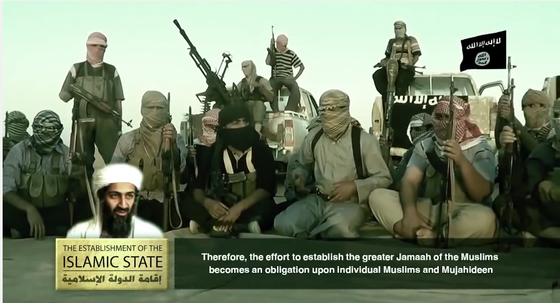| On July 13, Al Qaeda's As Sahab posted this video of Osama bin Laden from the summer of 2001 on its Twitter feed. |
On July 13, al Qaeda's propaganda arm, As Sahab, tweeted a link to an old video of Osama bin Laden. Judging by markers in the video, including bin Laden's reference to the USS Cole bombing taking place "nine months ago" (al Qaeda attacked the Cole on Oct. 12, 2000), it appears the video was recorded in the middle of 2001.
The first part of bin Laden's lecture focuses on standard al Qaeda themes, including the war against America. In all likelihood, that is not why al Qaeda posted this particular video of bin Laden now. Instead, al Qaeda is attempting to use the video to counter the Islamic State, which has been disowned by al Qaeda's senior leadership, and its newly announced caliphate.
"Today, with the grace of Allah, we are redrawing the map of the Islamic world to become one state under the banner of the caliphate," bin Laden says.
The deceased al Qaeda leader goes on to explain that the Prophet Mohammed found that certain "pillars" were required to build a "strong Islamic State."

|
| As Sahab is advertising the video of bin Laden with this banner. A similar banner is being featured on a number of jihadist sites, including at the top of the Shumukh al Islam forum. |
"The Prophet spent 13 years in Mecca searching for these pillars: a strong group, obedience and respect, immigration, and jihad," bin Laden says, according to a translation obtained by The Long War Journal. Mohammed "was on a quest to find these four things," bin Laden continues. "He wanted to find a strong group that is willing to carry our jihad -- those two demands are complementary -- and be obedient and respectful. He found these four pillars after 13 years."
A few sentences later, bin Laden adds: "Those who move from east to west, claiming that they want to establish God's sharia but do not want to establish the prerequisites and pillars and do not want to tolerate the suffering of finding a group, obeying their leaders, migrating, and carrying out jihad are ignorant and unaware of the Prophet's doctrine."
The implied critique of the Islamic State and its announced caliphate, which covers parts of Syria and Iraq, is obvious. When viewed through bin Laden's testimony, the Islamic State has not built the "pillars" necessary for a caliphate, especially when it comes to "obeying their leaders."
Indeed, bin Laden's successor, Ayman al Zawahiri, has covered this issue in his messages addressing the Islamic State's history. As Sahab released two messages from Zawahiri concerning the Islamic State in May. "Listen to and obey your emir once again," Zawahiri says when addressing Baghdadi in the first message. "Come back to what your sheikhs, emirs, and those who preceded you on the path and immigration of jihad have worked hard for." In both of his messages in May, Zawahiri builds a case against Baghdadi, showing that the Islamic State's self-appointed "caliph" was once Zawahiri's subordinate. Therefore, by accusing Baghdadi of being disobedient towards his leader, Zawahiri was also accusing him of ignoring one of the "pillars" necessary for building a true Islamic State.
Al Qaeda's charge against Abu Bakr al Baghdadi's group could extend further, given that one of the pillars mentioned by bin Laden requires a jihadist group to be "obedient and respectful." Other jihadist groups and ideologues whose beliefs are not all that different from the Islamic State's have repeatedly accused Baghdadi's group of being disrespectful towards anyone who disagrees with its attempted power grab. The disagreements have even led to vicious infighting between jihadists in Syria.
Bin Laden goes on to recount, in brief, the history of al Qaeda's relations with the Taliban. The Taliban "allowed us to establish training camps on their land, regardless of all the international pressure against them," bin Laden says. "They are also helping us in our preparations and training although they know that we are preparing to strike the United States of America." This statement is interesting because there has long been a debate over how the Taliban viewed such attacks. And this is further evidence that bin Laden was loose-lipped prior to the 9/11 attacks, upsetting some of his co-conspirators who wanted to maintain the utmost secrecy.
An audience member asks bin Laden about his bayat (oath of allegiance) to Mullah Omar, the Taliban's emir. And bin Laden's response likely has bearing on Abu Bakr al Baghdadi's claim to be the rightful caliph.
"My pledge of allegiance to the Emir of the Believers [Mullah Omar] is the great pledge of allegiance, which is mentioned in the chapters of the Koran and the stories of the Sunnah," bin Laden says. "Every Muslim should set his mind and heart and pledge allegiance to the Emir of the Believers Mullah Muhammad Omar for this is the great pledge."
The Islamic State's announced caliphate attempts to usurp the power and authority of all other jihadist groups, including the Taliban, by demanding that they swear bayat to the new caliph. This has drawn criticism from highly influential jihadist ideologues such as Abu Muhammad al Maqdisi, as well as al Qaeda in the Islamic Maghreb (AQIM).
Bin Laden argues that Mullah Omar was deserving of such a pledge, and the implication of his testimony is that Abu Bakr al Baghdadi is not.
Bin Laden cites Muhammad Bin Abd al Wahhab, the 18th century Islamic leader, as saying: ''When a man is in charge of a country and the scholars in this country accept his ruling, then his ruling as an emir of the believers is legitimate.'' Bin Laden says that Mullah Omar has satisfied this requirement, claiming that "more than 1,500 scholars [have] pledged" their allegiance to Omar. Therefore, bin Laden argues, "it is the duty of everyone to pledge allegiance to him."
In Abu Bakr al Baghdadi's case, the situation is precisely the opposite. Even before he announced to the world that he was the new caliph, both Baghdadi and his organization drew widespread rejection from leading jihadists, including groups that are the Islamic State's ideological kinsmen. And while jihadists considered Mullah Omar the true ruler of Afghanistan, Baghdadi's authority inside Syria was never widely recognized as legitimate, even by his fellow jihadists.
It is widely believed that the new caliph should be descended from the Quraish tribe, from which Islam's earliest leaders, including Mohammed, came. In seeking to buttress Abu Bakr al Baghdadi's claim to be the new caliph, the Islamic State has claimed that he is descended from the Quraish tribe.
Bin Laden says in the video that Mullah Omar's ancestry should not bar him from being the rightful ruler. Omar is not descended from the Quraish tribe, but bin Laden says this is a "minor factor," which can be ignored given the circumstances that existed at the time. The "pledge of allegiance" to Omar is "legitimate," bin Laden insists.
Al Qaeda has been building its ideological arguments against the Islamic State's caliphate for months, well before the group publicly claimed that Baghdadi was the new caliph. In January, for instance, Zawahiri explained that the rightful ruler of an Islamic state should have the approval of leading jihadist figures. This was almost certainly a pointed criticism of Baghdadi, who first tried to name himself the ruler in Syria.
Bin Laden's words weigh heavily for both sides
Some veteran al Qaeda-linked jihadists have urged al Qaeda's senior leadership to do more to undermine the Islamic State. For instance, Hani al Sibai, a longtime ally of Zawahiri, wrote in a tweet earlier this month that al Qaeda needs to issue an "explicit" statement rejecting the Islamic State's caliphate. Sibai wrote, "Suggestions and innuendoes will not do!"
Al Qaeda's decision to post the video of bin Laden from 2001 does not constitute an "explicit" statement, but it does attempt to undermine the Islamic State's claims.
The Islamic State has taken a more direct approach in its own propaganda. When it was known as the Islamic State of Iraq and the Sham (ISIS), Baghdadi's organization released a series of slickly-produced videos titled "The Establishment of the Islamic State."
The ISIS videos cited quotes from various deceased al Qaeda leaders praising the Islamic State prior to its expansion into Syria, when it was known as the Islamic State of Iraq (ISI). The argument was straightforward: Al Qaeda used to endorse Baghdadi's organization as a legitimate entity, but now rejects it.
From al Qaeda's perspective, of course, Zawahiri and his subordinates had good reasons to object to the ISIS' expansion into Syria and then eventually disown the group.
Regardless, the ISIS video series effectively portrayed Baghdadi's operation as the rightful heir to al Qaeda's legacy. The videos drove home this point by featuring deceased al Qaeda bigwigs such as Osama bin Laden, Abu Yahya al Libi, and Anwar al Awlaki, among others. All of them had praised the ISI. Screen shots from the videos are included below.
In the ongoing propaganda war between the Islamic State and al Qaeda, therefore, bin Laden's words still weigh heavily for both sides.
Screen shots from "The Establishment of the Islamic State" propaganda series, which was released by the Islamic State of Iraq and the Sham (ISIS). The group rebranded itself as simply the "Islamic State" in June.
























